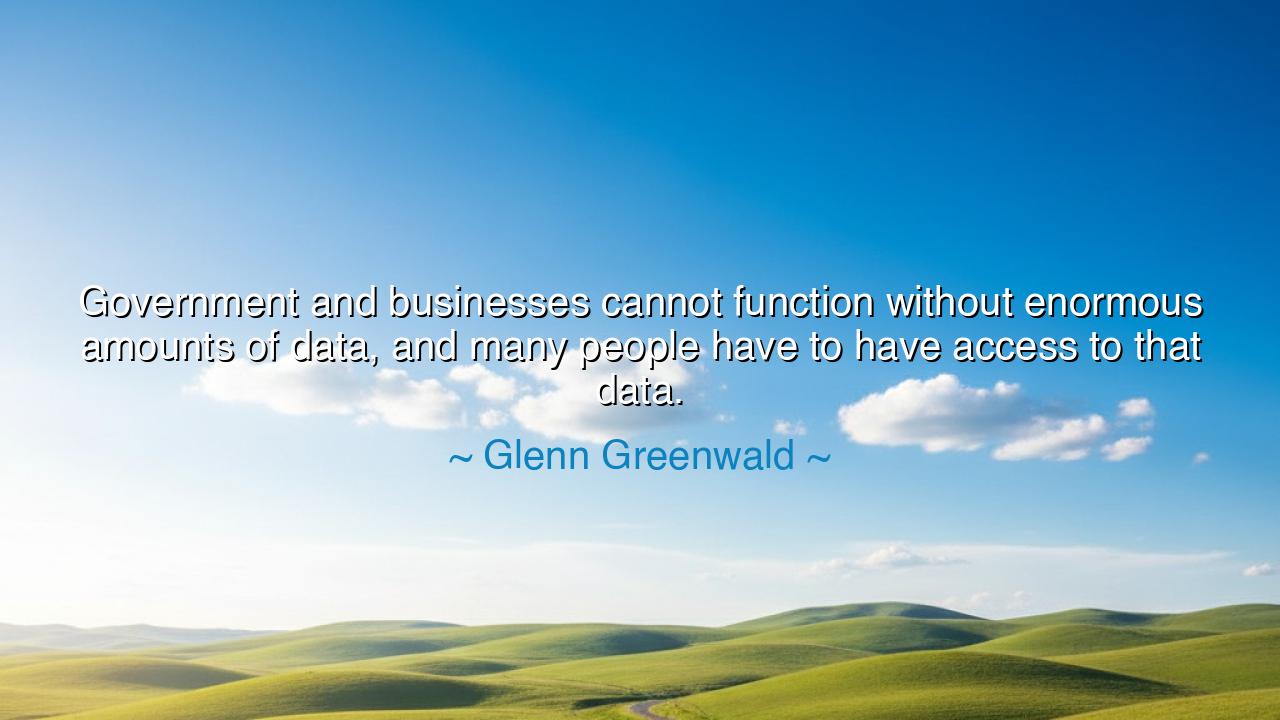
Government and businesses cannot function without enormous
Government and businesses cannot function without enormous amounts of data, and many people have to have access to that data.






"Government and businesses cannot function without enormous amounts of data, and many people have to have access to that data." – Glenn Greenwald
In these words, Glenn Greenwald, the journalist who exposed some of the most secretive surveillance programs in modern history, speaks of the new currency of power—data. His statement, though calm in tone, carries the weight of an ancient warning: that knowledge, once confined to books and minds, now flows through invisible rivers of information, shaping nations and governing lives. To understand his words is to recognize that in the modern age, data is the lifeblood of civilization—feeding governments, guiding economies, and mapping the patterns of human existence. Without it, both public and private institutions would falter, unable to plan, to predict, or to protect.
Yet Greenwald’s insight is not mere admiration for technological progress. It is a reflection born of concern, forged in the fires of the Edward Snowden revelations. In 2013, Greenwald became the voice through which the world learned how vast the modern surveillance apparatus had grown—how governments, in pursuit of security, had begun to collect and analyze the private communications of millions. It was a moment when the world stood still and realized the truth of Greenwald’s words: that many must have access to this data for systems to function—but in those many hands lies both necessity and danger.
For from the beginning of recorded history, power has always gathered where information dwells. In ancient Egypt, the scribes who kept the records of harvests and taxes were more powerful than soldiers; in the courts of emperors, spies and scholars determined the fate of kingdoms. Today, the scribes are coders, and the scrolls are servers. Governments and corporations alike depend on oceans of information—to manage citizens, markets, armies, and infrastructures. But as Greenwald reminds us, the more people granted access to these digital treasures, the greater the risk of abuse, corruption, and intrusion into the private sphere of human life.
Consider the story of Cambridge Analytica, a name now etched into the modern conscience. Through the gathering of online data, private companies were able to profile and influence the thoughts, votes, and emotions of millions. The very systems built to connect people were turned into mirrors of manipulation. Here again, Greenwald’s insight proved prophetic: when data becomes power, and power seeks control, liberty trembles. The boundary between governance and surveillance blurs; the citizen becomes both participant and subject, both contributor and commodity.
Yet Greenwald’s words are not only a warning—they are also a mirror held to our collective dependence. For indeed, modern life itself could not stand without the structures that data sustains. Hospitals need it to heal, cities to move, and economies to breathe. Even the most benevolent institutions—the ones that educate, serve, and protect—require access to information to function. The challenge, then, is not to reject data, but to govern its guardians. Like fire, it illuminates and destroys; like water, it nourishes and floods. The wisdom lies not in denial, but in balance.
In the style of the ancients, we may say: beware the empire that knows too much of its people, and the people who know nothing of their empire. When transparency flows upward, freedom grows; when secrecy flows downward, oppression begins. Greenwald, in his modern way, echoes an old truth—the same truth that Socrates spoke of knowledge, or that Cicero demanded of government: that power must be watched as it watches others. For every database that stores, there must be a conscience that questions. For every network that gathers, there must be a citizen who demands accountability.
The lesson of Greenwald’s quote is thus both practical and moral: do not surrender your privacy carelessly, and do not allow your government or your employers to wield data without oversight. Learn, question, and understand the systems that shape your digital world. Use information, but remain its master. Build technologies that serve humanity, not enslave it. For in the age of data, the measure of freedom is no longer written in the number of laws or weapons a nation possesses, but in the integrity with which it handles the truth of its people. And if we fail to guard that truth, then all the progress of the modern age will have been but a gilded chain upon the human soul.






AAdministratorAdministrator
Welcome, honored guests. Please leave a comment, we will respond soon